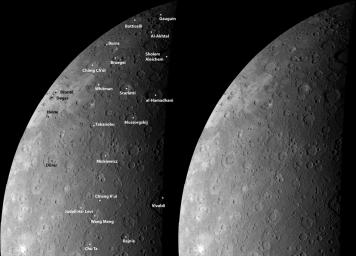
|
Mercury’s Craters from a New Perspective
- Click the image above for a larger view
- Full-Res JPEG (2312 x 1664) (466.9 kB)
- Full-Res TIFF (2312 x 1664) (3.9 MB)
Caption:
As MESSENGER approached Mercury, the NAC acquired images to create a mosaic of the entire planet. The mosaic shown here was created from about half of those images and is shown in an orthographic projection. This view is in contrast to the cylindrical equidistant map mosaic previously released. For this mosaic, an orthographic projection was used to create a view that has the perspective that one would see from deep space. Over three decades earlier, Mariner 10 viewed this portion of Mercury's surface, and the craters that were named on the basis of those images are labeled on this mosaic. The MESSENGER images of this same territory are allowing scientists to study Mercury's surface under different illumination conditions, and these complementary views provide new insight into the nature of the geologic features on Mercury.
Date Acquired:
January 14, 2008
Instrument:
Mosaic created with images taken by the Narrow Angle Camera (NAC) of the Mercury Dual Imaging System (MDIS)
Resolution:
1.5 kilometers/pixel (0.93 miles/pixel)
Scale:
This mosaic shows Mercury from the equator nearly to the northern pole, a distance of about one Mercury radius (2440 kilometers, 1516 miles)
Background Info:
These images are from MESSENGER, a NASA Discovery mission to conduct the first orbital study of the innermost planet, Mercury. For information regarding the use of images, see the MESSENGER image use policy .
Cataloging Keywords:
| Name | Value | Additional Values |
|---|---|---|
| Target | Mercury | |
| System | ||
| Target Type | Planet | |
| Mission | MESSENGER | Mariner |
| Instrument Host | MESSENGER | Mariner 10 |
| Host Type | Orbiter | Flyby Spacecraft |
| Instrument | Mercury Dual Imaging System (MDIS) | |
| Detector | Narrow Angle Camera (NAC) | |
| Extra Keywords | Crater, Grayscale, Map | |
| Acquisition Date | ||
| Release Date | 2008-07-07 | |
| Date in Caption | 2008-01-14 | |
| Image Credit | NASA/Johns Hopkins University Applied Physics Laboratory/Carnegie Institution of Washington | |
| Source | photojournal.jpl.nasa.gov/catalog/PIA10938 | |
| Identifier | PIA10938 | |
